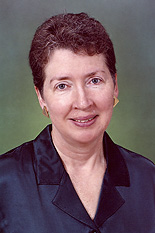Greer Receives NSF Funding for Ethics Courses
Professor Sandra Greer (Departments of Chemical and Biomolecular Engineering and Chemistry and Biochemistry), along with co-PIs Professor Robert Dooling (Department of Psychology) and Professor Art Popper (Department of Biology), have won an NSF grant to support the expansion of a program that will develop a series of ethics courses and workshops for graduate students, postdoctoral associates and new faculty to provide training on research integrity and to teach them to mentor others in ethics issues. The proposal, titled "Maryland Initiative on Research Ethics," outlines a three-year plan that includes developing additional ethics courses and course sections throughout the Clark School, the College of Chemical and Life Sciences (CLFS), and the College of Behavioral and Social Sciences (BSOS); extending the program throughout the University System of Maryland (USM); training postdoctoral associates to teach new ethics courses within the USM and at colleges around the world; and offering an annual Research Integrity Bowl. Greer and her colleagues are currently developing two new courses for graduate students and postdoctoral associates, designed to accommodate students from different disciplines: Research Ethics, a graduate version of existing undergraduate courses, will include readings, roleplaying, proper handling of data to avoid bias, attribution and citation, plagiarism, engineering practice, intellectual property, under-represented groups in the sciences, mentoring and the philosophy of value systems. Advanced Research Ethics, offered to postdoctoral associates and graduate students seeking a Graduate Certificate in Research Ethics (a program also currently under development), will address ethics training in various settings, and prepare them to teach. The team has also developed a one-day workshop for new science and engineering faculty members. For Greer, the path to the NSF grant began in 1994, when, noticing a lack of classroom discussion and textbooks on ethics in the sciences, she designed and taught an undergraduate course on the topic for the Department of Chemistry. Called "Ethics in Science and Engineering," it has been cross-listed with the Department of Chemical and Biomolecular Engineering (ChBE) since 1995. Although offered by these two specific departments, it may be taken as a CORE elective, and has been popular with students from all engineering majors. Only two other science-oriented ethics courses have been offered on campus, including one offered by Greer's co-PIs, professors Dooling and Popper for students in CLFS and BSOS, and a recently introduced course in the Fischell Department of Bioengineering. Greer's undergraduate course, she explains, "is not to teach students about right and wrong, but how to recognize an ethical dilemma when they see one, and how to think through it. In some ways ethics is like engineering design…many people are given the same problem, criteria and boundaries, but you get multiple results. With ethics, some don't even realize there is a problem to begin with. Maybe they're most surprised by the fact that there are no hard and fast answers to some of these things—engineers are not used to ambiguity!" "I think the students come out [of the undergraduate class] having their awareness raised about these kinds of issues," says Greer. "I get letters back—mostly from students who go into industry—saying it was one of the most valuable things they ever did, that these things come up all the time in their lives, and that because of the class they have some basis on which to think about them."
January 8, 2008 Prev Next |


